Taxation Law Case Study: Income, Deductions, and Analysis of FCT Cases
VerifiedAdded on 2023/04/25
|11
|2164
|403
Case Study
AI Summary
This taxation law case study analyzes Jane's income from personal exertion, including salary, bonuses, and awards, determining their taxability under ITAA 1936 and ITAA 1997. It examines allowable deductions for business and personal expenses, referencing relevant court cases like Mansfield v FCT and FCT v Wiener. The study also covers income from taxation business, investment property, dividends, franking credits, and capital gains, along with permissible donations. Part B delves into the FCT v Cooke and Sherden case, discussing its facts, the court's decision regarding non-cash benefits, and its relevance to modern tax law, particularly the enactment of section 21A. Desklib provides access to similar solved assignments and study resources for students.
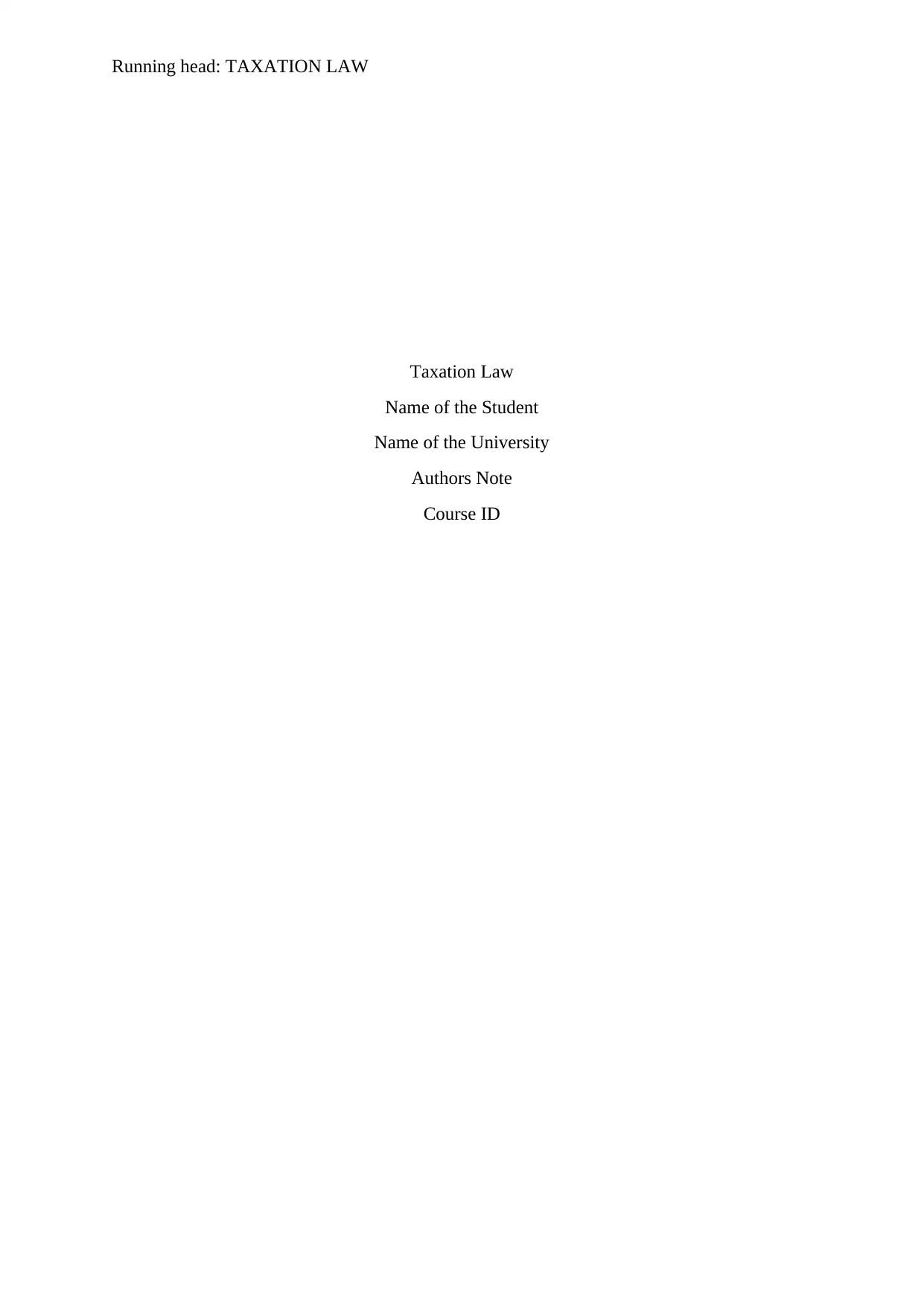
Running head: TAXATION LAW
Taxation Law
Name of the Student
Name of the University
Authors Note
Course ID
Taxation Law
Name of the Student
Name of the University
Authors Note
Course ID
Paraphrase This Document
Need a fresh take? Get an instant paraphrase of this document with our AI Paraphraser
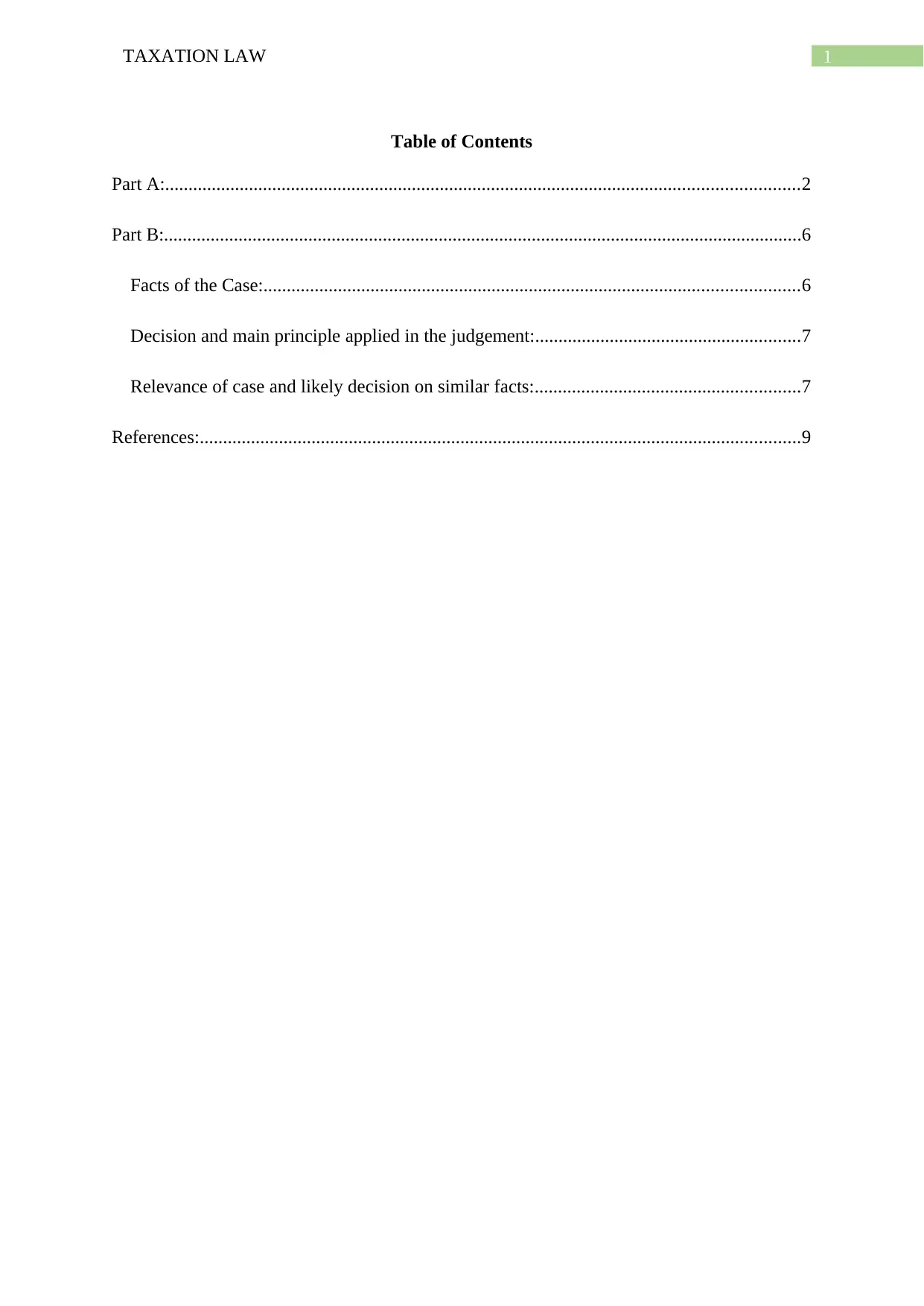
1TAXATION LAW
Table of Contents
Part A:........................................................................................................................................2
Part B:.........................................................................................................................................6
Facts of the Case:...................................................................................................................6
Decision and main principle applied in the judgement:.........................................................7
Relevance of case and likely decision on similar facts:.........................................................7
References:.................................................................................................................................9
Table of Contents
Part A:........................................................................................................................................2
Part B:.........................................................................................................................................6
Facts of the Case:...................................................................................................................6
Decision and main principle applied in the judgement:.........................................................7
Relevance of case and likely decision on similar facts:.........................................................7
References:.................................................................................................................................9
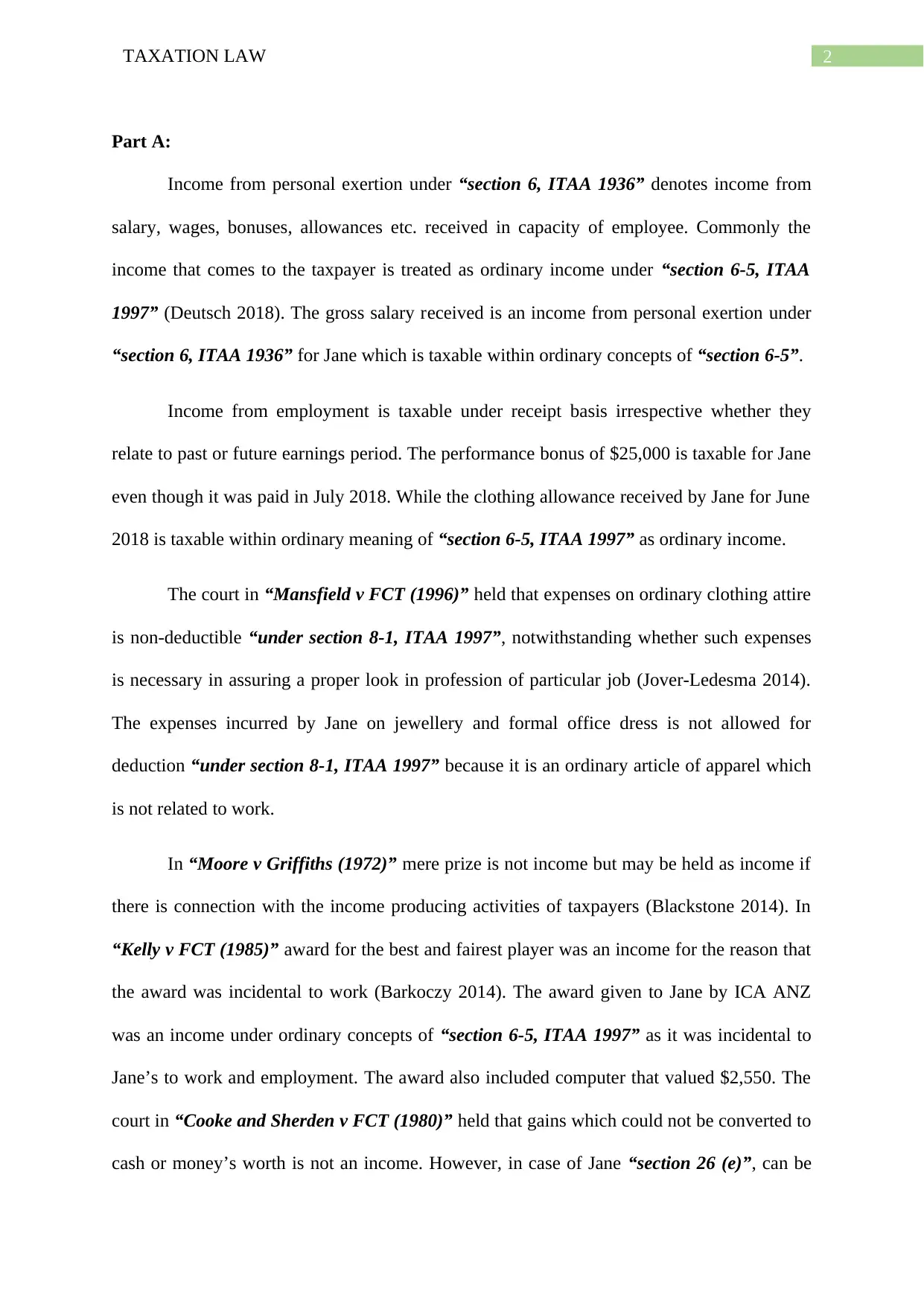
2TAXATION LAW
Part A:
Income from personal exertion under “section 6, ITAA 1936” denotes income from
salary, wages, bonuses, allowances etc. received in capacity of employee. Commonly the
income that comes to the taxpayer is treated as ordinary income under “section 6-5, ITAA
1997” (Deutsch 2018). The gross salary received is an income from personal exertion under
“section 6, ITAA 1936” for Jane which is taxable within ordinary concepts of “section 6-5”.
Income from employment is taxable under receipt basis irrespective whether they
relate to past or future earnings period. The performance bonus of $25,000 is taxable for Jane
even though it was paid in July 2018. While the clothing allowance received by Jane for June
2018 is taxable within ordinary meaning of “section 6-5, ITAA 1997” as ordinary income.
The court in “Mansfield v FCT (1996)” held that expenses on ordinary clothing attire
is non-deductible “under section 8-1, ITAA 1997”, notwithstanding whether such expenses
is necessary in assuring a proper look in profession of particular job (Jover-Ledesma 2014).
The expenses incurred by Jane on jewellery and formal office dress is not allowed for
deduction “under section 8-1, ITAA 1997” because it is an ordinary article of apparel which
is not related to work.
In “Moore v Griffiths (1972)” mere prize is not income but may be held as income if
there is connection with the income producing activities of taxpayers (Blackstone 2014). In
“Kelly v FCT (1985)” award for the best and fairest player was an income for the reason that
the award was incidental to work (Barkoczy 2014). The award given to Jane by ICA ANZ
was an income under ordinary concepts of “section 6-5, ITAA 1997” as it was incidental to
Jane’s to work and employment. The award also included computer that valued $2,550. The
court in “Cooke and Sherden v FCT (1980)” held that gains which could not be converted to
cash or money’s worth is not an income. However, in case of Jane “section 26 (e)”, can be
Part A:
Income from personal exertion under “section 6, ITAA 1936” denotes income from
salary, wages, bonuses, allowances etc. received in capacity of employee. Commonly the
income that comes to the taxpayer is treated as ordinary income under “section 6-5, ITAA
1997” (Deutsch 2018). The gross salary received is an income from personal exertion under
“section 6, ITAA 1936” for Jane which is taxable within ordinary concepts of “section 6-5”.
Income from employment is taxable under receipt basis irrespective whether they
relate to past or future earnings period. The performance bonus of $25,000 is taxable for Jane
even though it was paid in July 2018. While the clothing allowance received by Jane for June
2018 is taxable within ordinary meaning of “section 6-5, ITAA 1997” as ordinary income.
The court in “Mansfield v FCT (1996)” held that expenses on ordinary clothing attire
is non-deductible “under section 8-1, ITAA 1997”, notwithstanding whether such expenses
is necessary in assuring a proper look in profession of particular job (Jover-Ledesma 2014).
The expenses incurred by Jane on jewellery and formal office dress is not allowed for
deduction “under section 8-1, ITAA 1997” because it is an ordinary article of apparel which
is not related to work.
In “Moore v Griffiths (1972)” mere prize is not income but may be held as income if
there is connection with the income producing activities of taxpayers (Blackstone 2014). In
“Kelly v FCT (1985)” award for the best and fairest player was an income for the reason that
the award was incidental to work (Barkoczy 2014). The award given to Jane by ICA ANZ
was an income under ordinary concepts of “section 6-5, ITAA 1997” as it was incidental to
Jane’s to work and employment. The award also included computer that valued $2,550. The
court in “Cooke and Sherden v FCT (1980)” held that gains which could not be converted to
cash or money’s worth is not an income. However, in case of Jane “section 26 (e)”, can be
⊘ This is a preview!⊘
Do you want full access?
Subscribe today to unlock all pages.

Trusted by 1+ million students worldwide
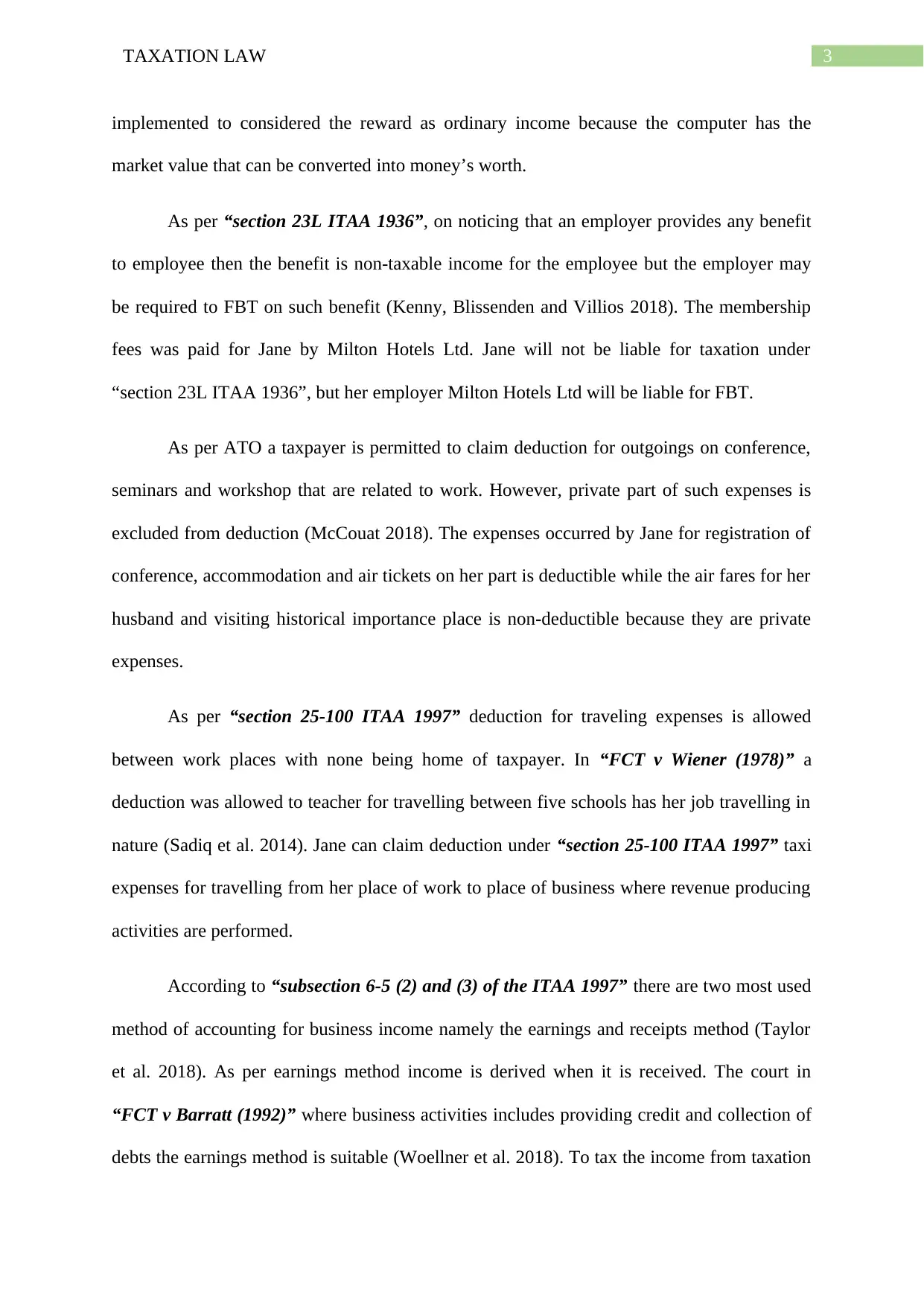
3TAXATION LAW
implemented to considered the reward as ordinary income because the computer has the
market value that can be converted into money’s worth.
As per “section 23L ITAA 1936”, on noticing that an employer provides any benefit
to employee then the benefit is non-taxable income for the employee but the employer may
be required to FBT on such benefit (Kenny, Blissenden and Villios 2018). The membership
fees was paid for Jane by Milton Hotels Ltd. Jane will not be liable for taxation under
“section 23L ITAA 1936”, but her employer Milton Hotels Ltd will be liable for FBT.
As per ATO a taxpayer is permitted to claim deduction for outgoings on conference,
seminars and workshop that are related to work. However, private part of such expenses is
excluded from deduction (McCouat 2018). The expenses occurred by Jane for registration of
conference, accommodation and air tickets on her part is deductible while the air fares for her
husband and visiting historical importance place is non-deductible because they are private
expenses.
As per “section 25-100 ITAA 1997” deduction for traveling expenses is allowed
between work places with none being home of taxpayer. In “FCT v Wiener (1978)” a
deduction was allowed to teacher for travelling between five schools has her job travelling in
nature (Sadiq et al. 2014). Jane can claim deduction under “section 25-100 ITAA 1997” taxi
expenses for travelling from her place of work to place of business where revenue producing
activities are performed.
According to “subsection 6-5 (2) and (3) of the ITAA 1997” there are two most used
method of accounting for business income namely the earnings and receipts method (Taylor
et al. 2018). As per earnings method income is derived when it is received. The court in
“FCT v Barratt (1992)” where business activities includes providing credit and collection of
debts the earnings method is suitable (Woellner et al. 2018). To tax the income from taxation
implemented to considered the reward as ordinary income because the computer has the
market value that can be converted into money’s worth.
As per “section 23L ITAA 1936”, on noticing that an employer provides any benefit
to employee then the benefit is non-taxable income for the employee but the employer may
be required to FBT on such benefit (Kenny, Blissenden and Villios 2018). The membership
fees was paid for Jane by Milton Hotels Ltd. Jane will not be liable for taxation under
“section 23L ITAA 1936”, but her employer Milton Hotels Ltd will be liable for FBT.
As per ATO a taxpayer is permitted to claim deduction for outgoings on conference,
seminars and workshop that are related to work. However, private part of such expenses is
excluded from deduction (McCouat 2018). The expenses occurred by Jane for registration of
conference, accommodation and air tickets on her part is deductible while the air fares for her
husband and visiting historical importance place is non-deductible because they are private
expenses.
As per “section 25-100 ITAA 1997” deduction for traveling expenses is allowed
between work places with none being home of taxpayer. In “FCT v Wiener (1978)” a
deduction was allowed to teacher for travelling between five schools has her job travelling in
nature (Sadiq et al. 2014). Jane can claim deduction under “section 25-100 ITAA 1997” taxi
expenses for travelling from her place of work to place of business where revenue producing
activities are performed.
According to “subsection 6-5 (2) and (3) of the ITAA 1997” there are two most used
method of accounting for business income namely the earnings and receipts method (Taylor
et al. 2018). As per earnings method income is derived when it is received. The court in
“FCT v Barratt (1992)” where business activities includes providing credit and collection of
debts the earnings method is suitable (Woellner et al. 2018). To tax the income from taxation
Paraphrase This Document
Need a fresh take? Get an instant paraphrase of this document with our AI Paraphraser
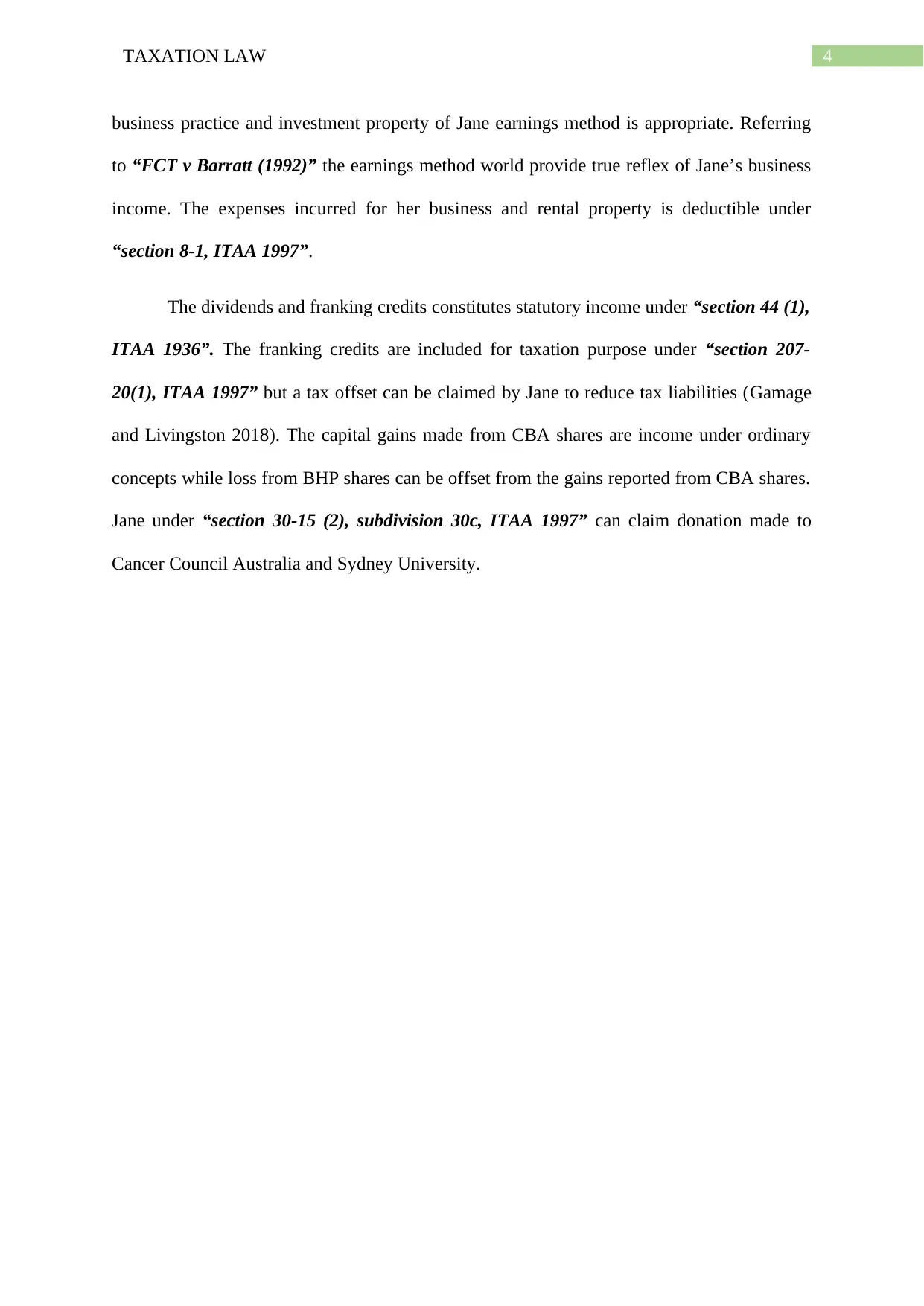
4TAXATION LAW
business practice and investment property of Jane earnings method is appropriate. Referring
to “FCT v Barratt (1992)” the earnings method world provide true reflex of Jane’s business
income. The expenses incurred for her business and rental property is deductible under
“section 8-1, ITAA 1997”.
The dividends and franking credits constitutes statutory income under “section 44 (1),
ITAA 1936”. The franking credits are included for taxation purpose under “section 207-
20(1), ITAA 1997” but a tax offset can be claimed by Jane to reduce tax liabilities (Gamage
and Livingston 2018). The capital gains made from CBA shares are income under ordinary
concepts while loss from BHP shares can be offset from the gains reported from CBA shares.
Jane under “section 30-15 (2), subdivision 30c, ITAA 1997” can claim donation made to
Cancer Council Australia and Sydney University.
business practice and investment property of Jane earnings method is appropriate. Referring
to “FCT v Barratt (1992)” the earnings method world provide true reflex of Jane’s business
income. The expenses incurred for her business and rental property is deductible under
“section 8-1, ITAA 1997”.
The dividends and franking credits constitutes statutory income under “section 44 (1),
ITAA 1936”. The franking credits are included for taxation purpose under “section 207-
20(1), ITAA 1997” but a tax offset can be claimed by Jane to reduce tax liabilities (Gamage
and Livingston 2018). The capital gains made from CBA shares are income under ordinary
concepts while loss from BHP shares can be offset from the gains reported from CBA shares.
Jane under “section 30-15 (2), subdivision 30c, ITAA 1997” can claim donation made to
Cancer Council Australia and Sydney University.
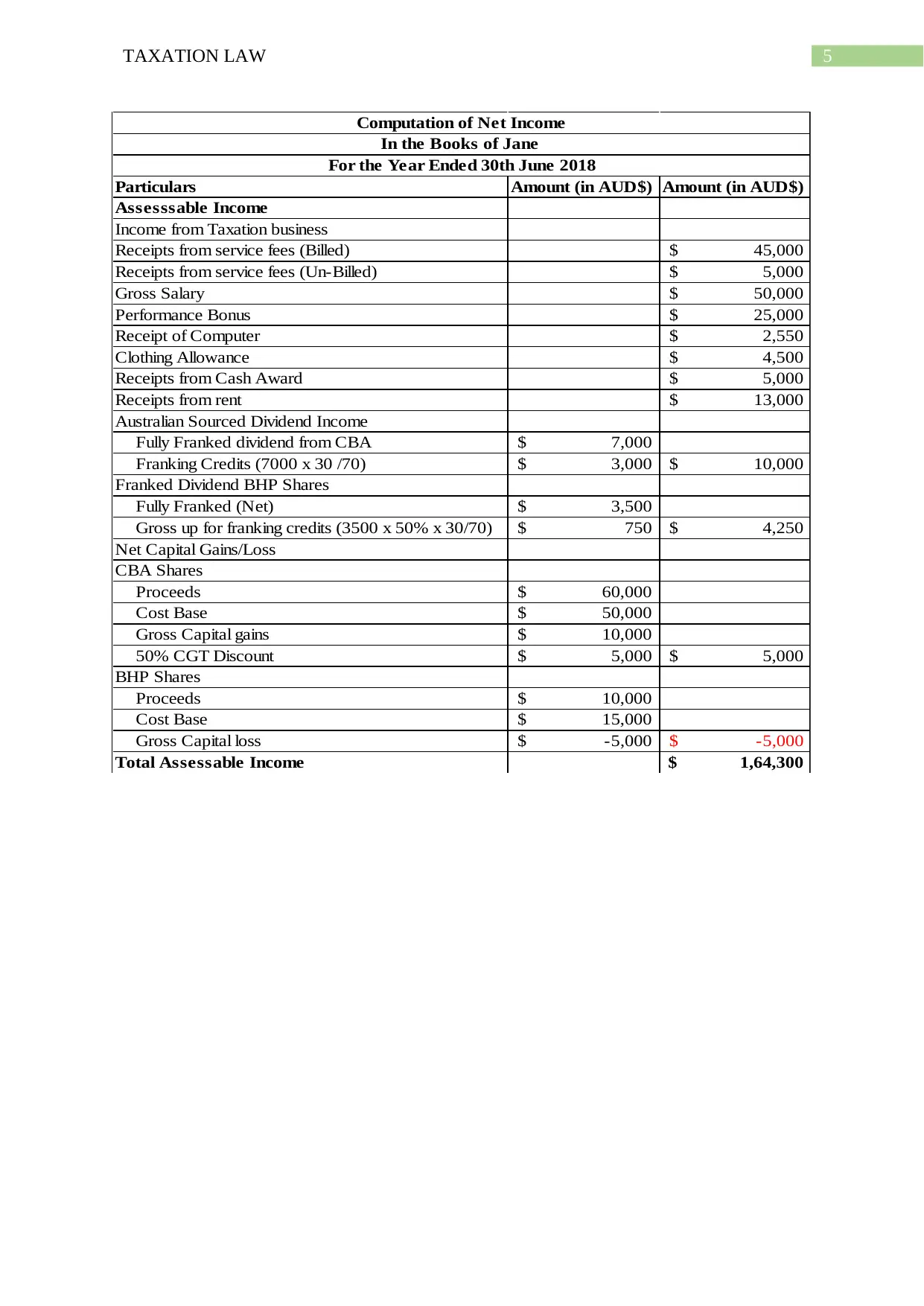
5TAXATION LAW
Particulars Amount (in AUD$) Amount (in AUD$)
Assesssable Income
Income from Taxation business
Receipts from service fees (Billed) 45,000$
Receipts from service fees (Un-Billed) 5,000$
Gross Salary 50,000$
Performance Bonus 25,000$
Receipt of Computer 2,550$
Clothing Allowance 4,500$
Receipts from Cash Award 5,000$
Receipts from rent 13,000$
Australian Sourced Dividend Income
Fully Franked dividend from CBA 7,000$
Franking Credits (7000 x 30 /70) 3,000$ 10,000$
Franked Dividend BHP Shares
Fully Franked (Net) 3,500$
Gross up for franking credits (3500 x 50% x 30/70) 750$ 4,250$
Net Capital Gains/Loss
CBA Shares
Proceeds 60,000$
Cost Base 50,000$
Gross Capital gains 10,000$
50% CGT Discount 5,000$ 5,000$
BHP Shares
Proceeds 10,000$
Cost Base 15,000$
Gross Capital loss -5,000$ -5,000$
Total Assessable Income 1,64,300$
Computation of Net Income
In the Books of Jane
For the Year Ended 30th June 2018
Particulars Amount (in AUD$) Amount (in AUD$)
Assesssable Income
Income from Taxation business
Receipts from service fees (Billed) 45,000$
Receipts from service fees (Un-Billed) 5,000$
Gross Salary 50,000$
Performance Bonus 25,000$
Receipt of Computer 2,550$
Clothing Allowance 4,500$
Receipts from Cash Award 5,000$
Receipts from rent 13,000$
Australian Sourced Dividend Income
Fully Franked dividend from CBA 7,000$
Franking Credits (7000 x 30 /70) 3,000$ 10,000$
Franked Dividend BHP Shares
Fully Franked (Net) 3,500$
Gross up for franking credits (3500 x 50% x 30/70) 750$ 4,250$
Net Capital Gains/Loss
CBA Shares
Proceeds 60,000$
Cost Base 50,000$
Gross Capital gains 10,000$
50% CGT Discount 5,000$ 5,000$
BHP Shares
Proceeds 10,000$
Cost Base 15,000$
Gross Capital loss -5,000$ -5,000$
Total Assessable Income 1,64,300$
Computation of Net Income
In the Books of Jane
For the Year Ended 30th June 2018
⊘ This is a preview!⊘
Do you want full access?
Subscribe today to unlock all pages.

Trusted by 1+ million students worldwide
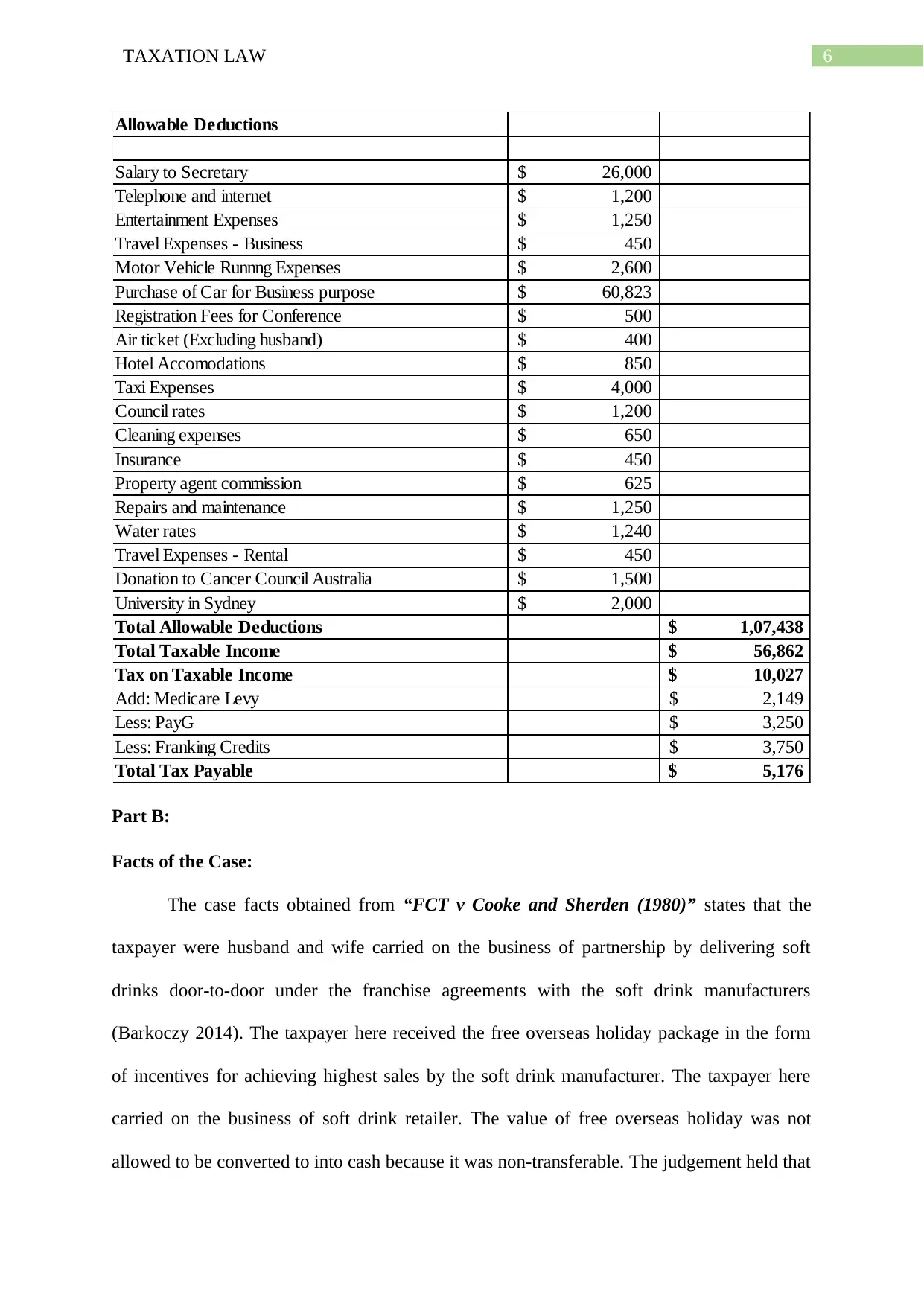
6TAXATION LAW
Allowable Deductions
Salary to Secretary 26,000$
Telephone and internet 1,200$
Entertainment Expenses 1,250$
Travel Expenses - Business 450$
Motor Vehicle Runnng Expenses 2,600$
Purchase of Car for Business purpose 60,823$
Registration Fees for Conference 500$
Air ticket (Excluding husband) 400$
Hotel Accomodations 850$
Taxi Expenses 4,000$
Council rates 1,200$
Cleaning expenses 650$
Insurance 450$
Property agent commission 625$
Repairs and maintenance 1,250$
Water rates 1,240$
Travel Expenses - Rental 450$
Donation to Cancer Council Australia 1,500$
University in Sydney 2,000$
Total Allowable Deductions 1,07,438$
Total Taxable Income 56,862$
Tax on Taxable Income 10,027$
Add: Medicare Levy 2,149$
Less: PayG 3,250$
Less: Franking Credits 3,750$
Total Tax Payable 5,176$
Part B:
Facts of the Case:
The case facts obtained from “FCT v Cooke and Sherden (1980)” states that the
taxpayer were husband and wife carried on the business of partnership by delivering soft
drinks door-to-door under the franchise agreements with the soft drink manufacturers
(Barkoczy 2014). The taxpayer here received the free overseas holiday package in the form
of incentives for achieving highest sales by the soft drink manufacturer. The taxpayer here
carried on the business of soft drink retailer. The value of free overseas holiday was not
allowed to be converted to into cash because it was non-transferable. The judgement held that
Allowable Deductions
Salary to Secretary 26,000$
Telephone and internet 1,200$
Entertainment Expenses 1,250$
Travel Expenses - Business 450$
Motor Vehicle Runnng Expenses 2,600$
Purchase of Car for Business purpose 60,823$
Registration Fees for Conference 500$
Air ticket (Excluding husband) 400$
Hotel Accomodations 850$
Taxi Expenses 4,000$
Council rates 1,200$
Cleaning expenses 650$
Insurance 450$
Property agent commission 625$
Repairs and maintenance 1,250$
Water rates 1,240$
Travel Expenses - Rental 450$
Donation to Cancer Council Australia 1,500$
University in Sydney 2,000$
Total Allowable Deductions 1,07,438$
Total Taxable Income 56,862$
Tax on Taxable Income 10,027$
Add: Medicare Levy 2,149$
Less: PayG 3,250$
Less: Franking Credits 3,750$
Total Tax Payable 5,176$
Part B:
Facts of the Case:
The case facts obtained from “FCT v Cooke and Sherden (1980)” states that the
taxpayer were husband and wife carried on the business of partnership by delivering soft
drinks door-to-door under the franchise agreements with the soft drink manufacturers
(Barkoczy 2014). The taxpayer here received the free overseas holiday package in the form
of incentives for achieving highest sales by the soft drink manufacturer. The taxpayer here
carried on the business of soft drink retailer. The value of free overseas holiday was not
allowed to be converted to into cash because it was non-transferable. The judgement held that
Paraphrase This Document
Need a fresh take? Get an instant paraphrase of this document with our AI Paraphraser
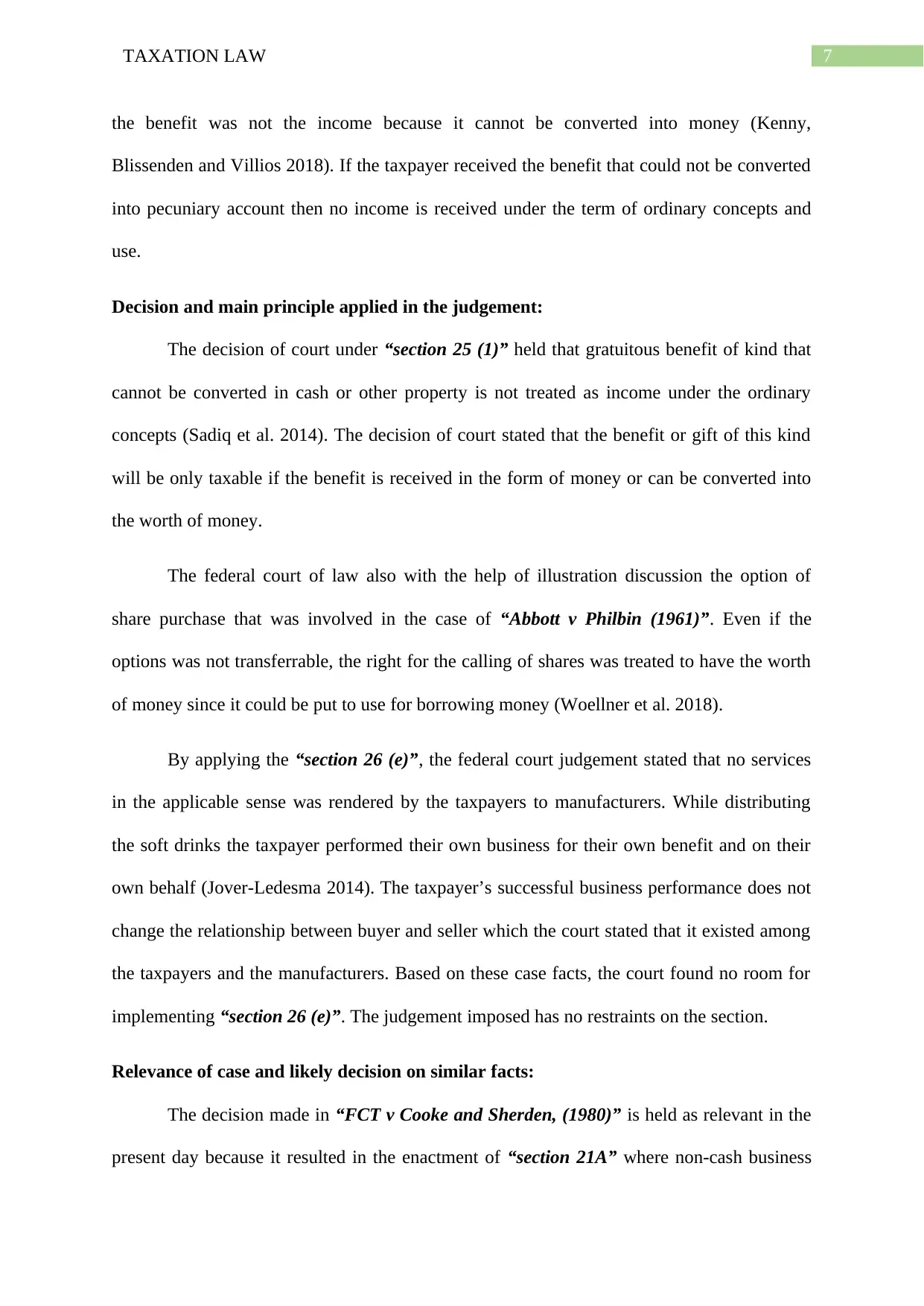
7TAXATION LAW
the benefit was not the income because it cannot be converted into money (Kenny,
Blissenden and Villios 2018). If the taxpayer received the benefit that could not be converted
into pecuniary account then no income is received under the term of ordinary concepts and
use.
Decision and main principle applied in the judgement:
The decision of court under “section 25 (1)” held that gratuitous benefit of kind that
cannot be converted in cash or other property is not treated as income under the ordinary
concepts (Sadiq et al. 2014). The decision of court stated that the benefit or gift of this kind
will be only taxable if the benefit is received in the form of money or can be converted into
the worth of money.
The federal court of law also with the help of illustration discussion the option of
share purchase that was involved in the case of “Abbott v Philbin (1961)”. Even if the
options was not transferrable, the right for the calling of shares was treated to have the worth
of money since it could be put to use for borrowing money (Woellner et al. 2018).
By applying the “section 26 (e)”, the federal court judgement stated that no services
in the applicable sense was rendered by the taxpayers to manufacturers. While distributing
the soft drinks the taxpayer performed their own business for their own benefit and on their
own behalf (Jover-Ledesma 2014). The taxpayer’s successful business performance does not
change the relationship between buyer and seller which the court stated that it existed among
the taxpayers and the manufacturers. Based on these case facts, the court found no room for
implementing “section 26 (e)”. The judgement imposed has no restraints on the section.
Relevance of case and likely decision on similar facts:
The decision made in “FCT v Cooke and Sherden, (1980)” is held as relevant in the
present day because it resulted in the enactment of “section 21A” where non-cash business
the benefit was not the income because it cannot be converted into money (Kenny,
Blissenden and Villios 2018). If the taxpayer received the benefit that could not be converted
into pecuniary account then no income is received under the term of ordinary concepts and
use.
Decision and main principle applied in the judgement:
The decision of court under “section 25 (1)” held that gratuitous benefit of kind that
cannot be converted in cash or other property is not treated as income under the ordinary
concepts (Sadiq et al. 2014). The decision of court stated that the benefit or gift of this kind
will be only taxable if the benefit is received in the form of money or can be converted into
the worth of money.
The federal court of law also with the help of illustration discussion the option of
share purchase that was involved in the case of “Abbott v Philbin (1961)”. Even if the
options was not transferrable, the right for the calling of shares was treated to have the worth
of money since it could be put to use for borrowing money (Woellner et al. 2018).
By applying the “section 26 (e)”, the federal court judgement stated that no services
in the applicable sense was rendered by the taxpayers to manufacturers. While distributing
the soft drinks the taxpayer performed their own business for their own benefit and on their
own behalf (Jover-Ledesma 2014). The taxpayer’s successful business performance does not
change the relationship between buyer and seller which the court stated that it existed among
the taxpayers and the manufacturers. Based on these case facts, the court found no room for
implementing “section 26 (e)”. The judgement imposed has no restraints on the section.
Relevance of case and likely decision on similar facts:
The decision made in “FCT v Cooke and Sherden, (1980)” is held as relevant in the
present day because it resulted in the enactment of “section 21A” where non-cash business
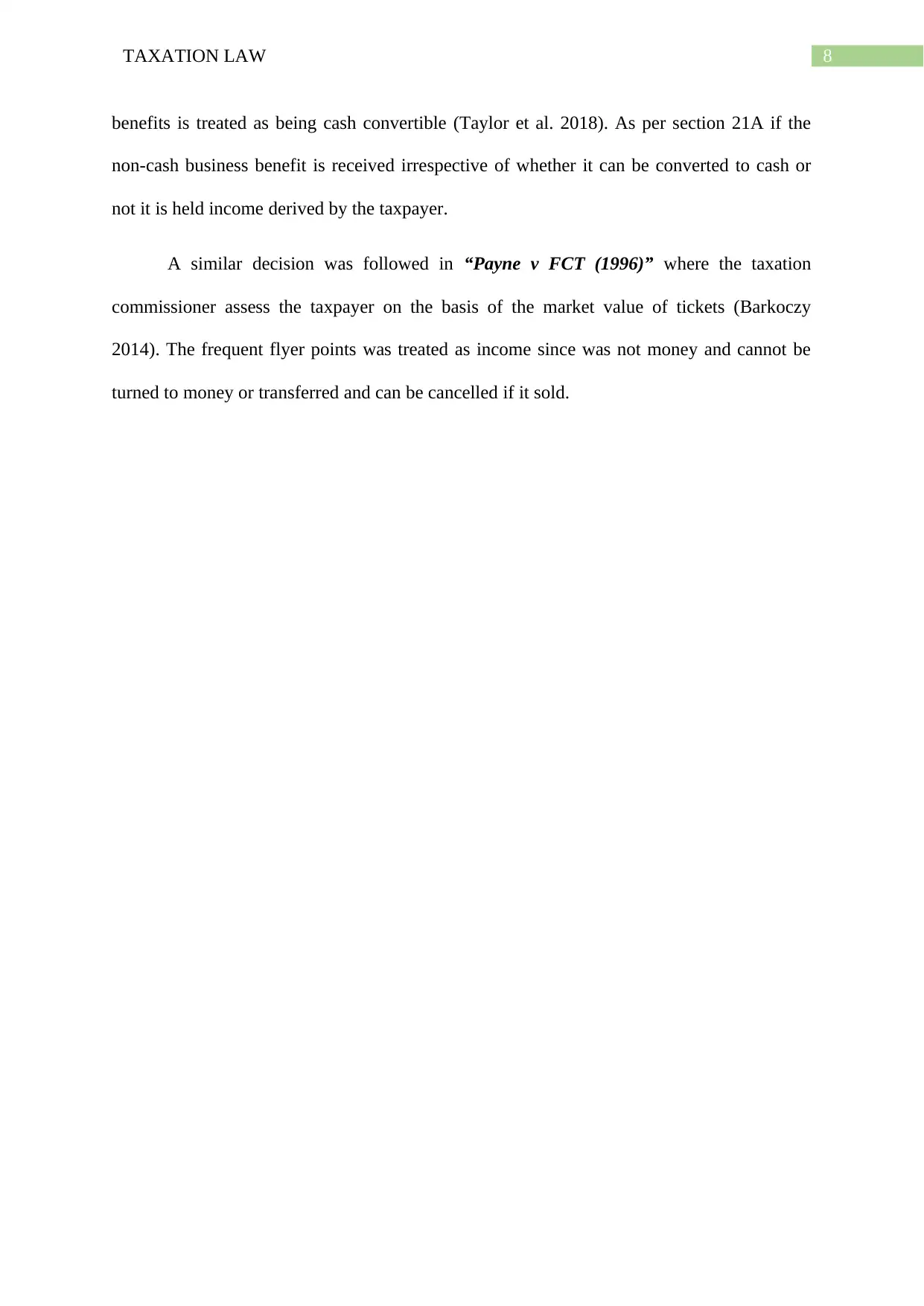
8TAXATION LAW
benefits is treated as being cash convertible (Taylor et al. 2018). As per section 21A if the
non-cash business benefit is received irrespective of whether it can be converted to cash or
not it is held income derived by the taxpayer.
A similar decision was followed in “Payne v FCT (1996)” where the taxation
commissioner assess the taxpayer on the basis of the market value of tickets (Barkoczy
2014). The frequent flyer points was treated as income since was not money and cannot be
turned to money or transferred and can be cancelled if it sold.
benefits is treated as being cash convertible (Taylor et al. 2018). As per section 21A if the
non-cash business benefit is received irrespective of whether it can be converted to cash or
not it is held income derived by the taxpayer.
A similar decision was followed in “Payne v FCT (1996)” where the taxation
commissioner assess the taxpayer on the basis of the market value of tickets (Barkoczy
2014). The frequent flyer points was treated as income since was not money and cannot be
turned to money or transferred and can be cancelled if it sold.
⊘ This is a preview!⊘
Do you want full access?
Subscribe today to unlock all pages.

Trusted by 1+ million students worldwide
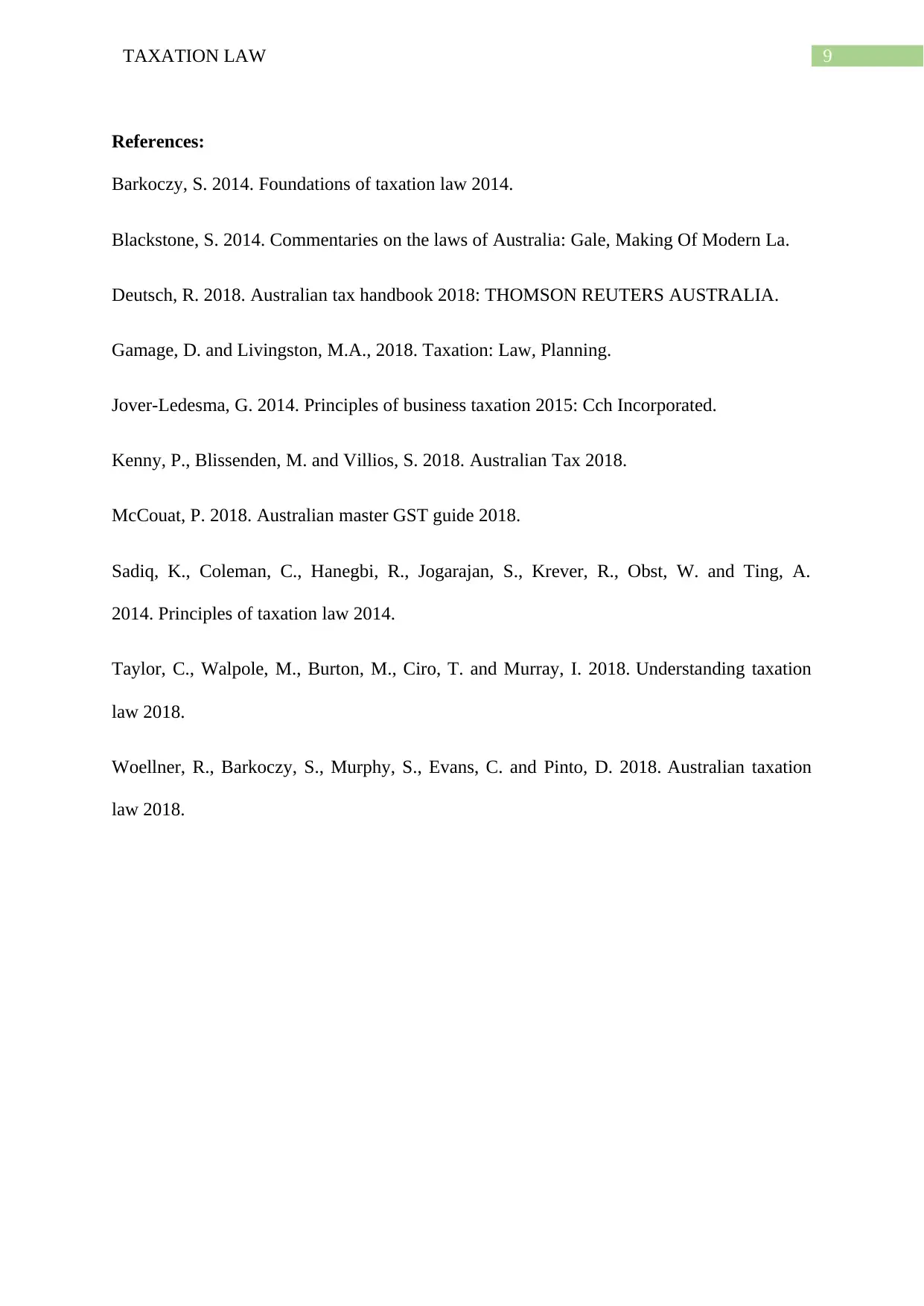
9TAXATION LAW
References:
Barkoczy, S. 2014. Foundations of taxation law 2014.
Blackstone, S. 2014. Commentaries on the laws of Australia: Gale, Making Of Modern La.
Deutsch, R. 2018. Australian tax handbook 2018: THOMSON REUTERS AUSTRALIA.
Gamage, D. and Livingston, M.A., 2018. Taxation: Law, Planning.
Jover-Ledesma, G. 2014. Principles of business taxation 2015: Cch Incorporated.
Kenny, P., Blissenden, M. and Villios, S. 2018. Australian Tax 2018.
McCouat, P. 2018. Australian master GST guide 2018.
Sadiq, K., Coleman, C., Hanegbi, R., Jogarajan, S., Krever, R., Obst, W. and Ting, A.
2014. Principles of taxation law 2014.
Taylor, C., Walpole, M., Burton, M., Ciro, T. and Murray, I. 2018. Understanding taxation
law 2018.
Woellner, R., Barkoczy, S., Murphy, S., Evans, C. and Pinto, D. 2018. Australian taxation
law 2018.
References:
Barkoczy, S. 2014. Foundations of taxation law 2014.
Blackstone, S. 2014. Commentaries on the laws of Australia: Gale, Making Of Modern La.
Deutsch, R. 2018. Australian tax handbook 2018: THOMSON REUTERS AUSTRALIA.
Gamage, D. and Livingston, M.A., 2018. Taxation: Law, Planning.
Jover-Ledesma, G. 2014. Principles of business taxation 2015: Cch Incorporated.
Kenny, P., Blissenden, M. and Villios, S. 2018. Australian Tax 2018.
McCouat, P. 2018. Australian master GST guide 2018.
Sadiq, K., Coleman, C., Hanegbi, R., Jogarajan, S., Krever, R., Obst, W. and Ting, A.
2014. Principles of taxation law 2014.
Taylor, C., Walpole, M., Burton, M., Ciro, T. and Murray, I. 2018. Understanding taxation
law 2018.
Woellner, R., Barkoczy, S., Murphy, S., Evans, C. and Pinto, D. 2018. Australian taxation
law 2018.
Paraphrase This Document
Need a fresh take? Get an instant paraphrase of this document with our AI Paraphraser
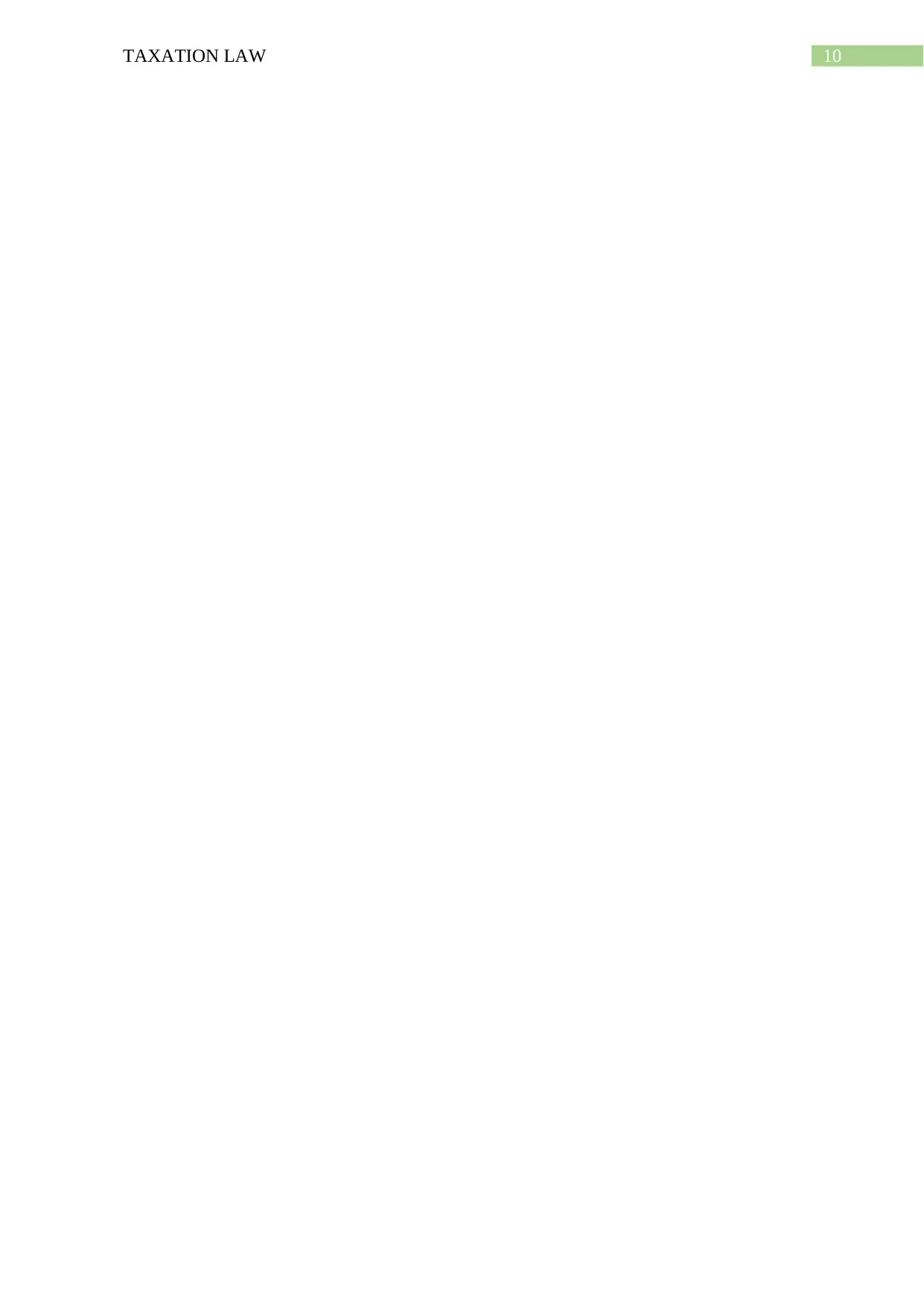
10TAXATION LAW
1 out of 11
Related Documents
Your All-in-One AI-Powered Toolkit for Academic Success.
+13062052269
info@desklib.com
Available 24*7 on WhatsApp / Email
![[object Object]](/_next/static/media/star-bottom.7253800d.svg)
Unlock your academic potential
Copyright © 2020–2025 A2Z Services. All Rights Reserved. Developed and managed by ZUCOL.





